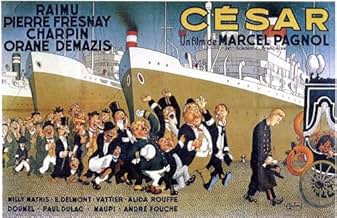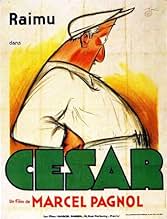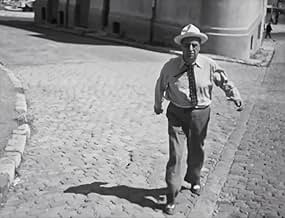Füge eine Handlung in deiner Sprache hinzuHonoré Panisse is dying, cheerfully, with friends, wife, and son at his side. He confesses to the priest in front of his friends; he insists that the doctor be truthful. But, he cannot bring... Alles lesenHonoré Panisse is dying, cheerfully, with friends, wife, and son at his side. He confesses to the priest in front of his friends; he insists that the doctor be truthful. But, he cannot bring himself to tell his son Cesariot that his real father is Marius, the absent son of César,... Alles lesenHonoré Panisse is dying, cheerfully, with friends, wife, and son at his side. He confesses to the priest in front of his friends; he insists that the doctor be truthful. But, he cannot bring himself to tell his son Cesariot that his real father is Marius, the absent son of César, Cesariot's godfather. Panisse leaves that to Fanny, the lad's mother. Dissembling that he... Alles lesen
- Honoré Panisse
- (as Charpin)
- Innocent Mangiapan
- (as Maupi)
- Le docteur Félicien Venelle
- (as Edouard Delmont)
- Pierre Dromard
- (as Bassac)
Empfohlene Bewertungen
'Cesar', the only one of the Marseille trilogy to not be directly based on the play, is the third and final film in the trilogy and a great way to end it. It is not quite as good as my personal favourite 'Marius', but is on the same level as 'Fanny' for generally the same reasons. Despite having occasional story problems, 'Cesar' (named after one of my favourite characters of the trilogy) is the most human, most understated and most moving of the three perhaps and benefits greatly from having Pagnol in the director's chair again and the original cast returning yet again.
It though does have the slightest story of the three films in the trilogy and the only one to feel slightly contrived on occasions. That is my only complaint though.
Like 'Marius' and 'Fanny', 'Cesar' looks lovely and surprisingly evocative. In fact all the great things of those two films are here, for the same and different reasons. Scotto returns as composer and his score is equally as whimsical and charming. Did appreciate that 'Cesar' did have a much better beginning than that of 'Fanny' and that it got to the point much quicker.
There is some nice wit in the writing, the dialogue can be described in the same way as the dialogue in the previous two films. It succeeds in the humorous elements and even more so the emotional moments, balancing both well while having more of the latter. Did love how understated and compassionate the story was.
Which added to the poignancy and humanity of one of the most easy to root for love stories in early talkies. The characters are still compellingly real and their situations are still relatable and relevant now, did find that what happens resonated with me. Pagnol's direction is never too static or theatrical, he stays true to his roots while opening up the drama enough so it does feel cinematic.
Fanny is slightly underdeveloped again, but again that is namely down to the deeper characterisations of the other characters. Especially Cesar. The acting is great again, especially Raimu giving perhaps his best performance of the trilogy and he was astounding in 'Marius' and 'Fanny' as well.
Concluding, great and a more than worthy end to a wonderful trilogy of films. 9/10
Marius (1931) + Fanny (1932) + César (1936)
"César" (1936): The Grand Finale of the Marseille Trilogy
Written and directed by Marcel Pagnol, "César" is the final film in the renowned Marseille Trilogy, holding a significant place in the golden age of French cinema. The fact that I'm only discovering these films now is a point of self-criticism. It's a serious oversight, especially for someone like me who prides themselves on their love for François Truffaut, to be unaware of Pagnol's trilogy. But perhaps this is a common thread among today's cinephiles-getting lost in the vast sea of information.
Within the context of the trilogy, "César" brings the story that began with "Marius" (1931) and "Fanny" (1932) to an emotional and philosophical climax. The film delves into the years following the events of the previous two films, examining the long-term consequences and impacts of the characters' decisions. From the perspective of both contemporary and period cinema, this makes "César" a significant work of French realism. Pagnol's mastery of dialogue, stemming from his theatrical background, is on full display in this film.
"César" weaves together all the themes and characters of the trilogy, crafting a magnificent conclusion to the story. Raimu's performance as César is not for nothing considered one of the most impressive acting examples in cinema history. The depth, complexity, and human aspects of César's character are brought to life perfectly through Raimu's extraordinary talent. The film goes beyond being just a family drama, touching upon philosophical themes such as the transience of life, the power of forgiveness, and intergenerational relationships. At times, I felt like I was reading Victor Hugo, not watching a film.
I would love to explore this trilogy from a filmmaker's perspective.
Yes, this trilogy isn't made up of films you'll watch frequently, but they are magnificent films to watch occasionally and cleanse your soul.
We owe thanks to Janus Films and Criterion for ensuring that films like these don't fade into obscurity.
While I loved MARIUS (1931) and Fanny (1932), I found myself falling asleep repeatedly while watching César. Again and again and again, I found myself dozing. At first, I thought I was just tired, but when I stopped the DVD each time I felt wide awake. I think in hindsight my reaction was because after the first few minutes of this movie, the trilogy, for me, was finished. In other words, the story was as complete as it should be and continuing it seemed superfluous. The 1961 Fanny film ended there, but continuing was probably, in hindsight, not the best decision. I honestly feel that the average viewer could see MARIUS and FANNY without having to see César. It just didn't seem necessary or compelling.
As far as performances and writing go, Raimu, who played Marius' father, was a marvelous actor and was excellent in all three movies. He was also fantastic in Pagnol's film La FEMME DU BOULANGER. An amazing talent. Also, Pagnol has written some amazing films apart from this series--try to see them all. It's just that of all of his work and the books I have read by him, my least favorite is César.
WUSSTEST DU SCHON:
- WissenswertesOdette Roger is credited in the opening credits as "la bonne de l'hotel" (the hotel maid) but does not appear in the film. The hotel sequence was cut out of the final print.
- Zitate
Honoré Panisse: One can't live without doing wrong.
- VerbindungenFeatured in Les sentiers Marcel Pagnol. Les chemins d'une vie (2005)
Top-Auswahl
Details
Box Office
- Bruttoertrag in den USA und Kanada
- 8.262 $
- Eröffnungswochenende in den USA und in Kanada
- 7.720 $
- 8. Jan. 2017
- Weltweiter Bruttoertrag
- 8.262 $
- Laufzeit2 Stunden 48 Minuten
- Farbe
- Sound-Mix
- Seitenverhältnis
- 1.37 : 1
Zu dieser Seite beitragen































